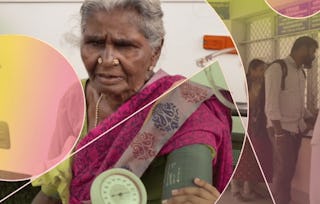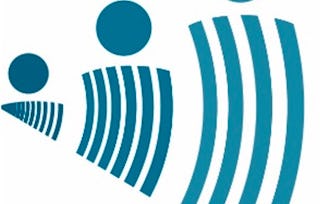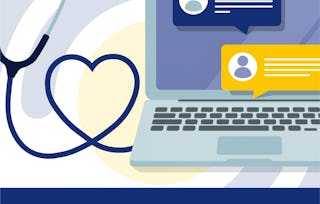This course provides the fundamental knowledge necessary for program managers and implementors in a hypertension control program, especially in resource-limited settings. The course is interactive and includes useful tips relevant to different settings. The course should be also relevant to physicians, nurses, pharmacists, community health workers, and others who are interested in learning about hypertension diagnosis and management.

Fundamentals for Implementing a Hypertension Program

Fundamentals for Implementing a Hypertension Program

Instructor: Kunihiro Matsushita, MD, PhD
1,891 already enrolled
Included with
33 reviews
What you'll learn
Learners will learn key concepts for hypertension diagnosis and management, as well as how to effectively operate hypertension programs.
Skills you'll gain
- Teamwork
- Collaboration
- Vital Signs
- Medication Dispensation
- Public Health and Disease Prevention
- Diagnostic Tests
- Blood Pressure
- Patient Evaluation
- Medication Therapy Management
- Patient-centered Care
- Chronic Diseases
- Healthcare Project Management
- Pharmacy Operations
- Communication
- Medication Administration
- Community Health
- Planning
- Patient Treatment
- Care Management
- Pharmacotherapy
- Skills section collapsed. Showing 9 of 20 skills.
Details to know

Add to your LinkedIn profile
6 assignments
See how employees at top companies are mastering in-demand skills

There are 6 modules in this course
This module—Module 1— will walk you through the fundamentals of hypertension, such as its burden and complications, and will provide you with an overview of two approaches to managing hypertension. You will learn that hypertension is a major health problem and how it can be managed, while also learning about major challenges that can make effective and efficient management of hypertension difficult. We will end with a few real-world examples of programs that have overcome those challenges and succeeded in improving hypertension management. In Modules 2 to 6, you will learn more about the diagnosis and treatment of hypertension, optimal clinic settings, use of the community as a platform of hypertension care, medication supply, and tips for effective and efficient program operation.
What's included
10 readings1 assignment10 plugins
Once a diagnosis of hypertension is confirmed, medical personnel should treat patients to reduce the risk of heart attack and stroke. In this module, we will discuss two "complementary" treatment approaches: lifestyle modifications and blood pressure-lowering medications. Lifestyle modifications have a beneficial effect on blood pressure as well as on health in general. Since lifestyle modifications are not easy to adopt, and even more challenging to maintain, most patients with hypertension also require one or more blood pressure-lowering medications. We will learn that hypertension in most patients can be controlled by following a simple medication protocol. These protocols are especially useful in resource-limited settings since it simplifies medication procurement and treatment processes at clinics, making it feasible to implement a hypertension program in any community you serve. Understanding these basics are essential to designing, planning, and operating successful hypertension programs.
What's included
7 readings1 assignment7 plugins
The medical clinic is the primary place where hypertension is diagnosed and managed. Although there is no established estimate, it is likely that there are more than 1 million clinics in the world. Medical clinics vary across countries and even within a country, in terms of the number and type of staff and equipment. Although each clinic is unique, several key elements make a clinic effective and efficient for hypertension care. Appropriately trained staff and adequate facilities for effective hypertension management are crucial, and most clinics may already have these in place. Also, the staff at clinics should collaborate with the patients, recognizing their needs and ensuring that the clinic is accessible to them. This concept is called “patient-centered care.” Let’s take a look at key features of clinic settings for hypertension control in this module.
What's included
6 readings1 assignment7 plugins
In this module, you will learn about diverse settings in the community where you may find good opportunities to control hypertension. You will also learn about task-sharing/shifting among teams of personnel with different backgrounds such as community health workers, nurses, pharmacists, physicians, and others in delivering efficient and effective care. We will provide real-world examples of community-based programs that have succeeded in improving hypertension control. You will also learn the key factors that made those hypertension programs in the community a success.
What's included
5 readings1 assignment6 plugins
In this module, we will review the basics of the medication supply system and share some tips for monitoring and managing medication inventories. We will also identify some challenges to medication supply and discuss potential solutions. All of these are crucial for improving both medication supply and access in hypertension programs.
What's included
4 readings1 assignment5 plugins
In this course thus far, you have learned key concepts for hypertension diagnosis and management, and can describe why hypertension is important and what kind of options are available to address it. However, knowledge is not enough for successful hypertension control programs. Why? Because knowledge is within each individual, and a program needs to have a number of individuals with different values and thoughts acting collaboratively and effectively towards the same goals. There are several key elements for any program (not only for hypertension) to be successfully implemented. Since there are other resources or courses that specifically and comprehensively summarize these elements, we will not cover them all in this module. We will focus on the following three that we believe are especially important: program planning, program monitoring and evaluation, and communication
What's included
4 readings1 assignment5 plugins
Instructor

Offered by
Explore more from Public Health
 Status: Free
Status: FreeUniversity of Copenhagen
 Status: Free Trial
Status: Free TrialJohns Hopkins University
 Status: Preview
Status: PreviewJohns Hopkins University
 Status: Free Trial
Status: Free TrialJohns Hopkins University
Why people choose Coursera for their career

Felipe M.

Jennifer J.

Larry W.

Chaitanya A.

Open new doors with Coursera Plus
Unlimited access to 10,000+ world-class courses, hands-on projects, and job-ready certificate programs - all included in your subscription
Advance your career with an online degree
Earn a degree from world-class universities - 100% online
Join over 3,400 global companies that choose Coursera for Business
Upskill your employees to excel in the digital economy
Frequently asked questions
To access the course materials, assignments and to earn a Certificate, you will need to purchase the Certificate experience when you enroll in a course. You can try a Free Trial instead, or apply for Financial Aid. The course may offer 'Full Course, No Certificate' instead. This option lets you see all course materials, submit required assessments, and get a final grade. This also means that you will not be able to purchase a Certificate experience.
When you purchase a Certificate you get access to all course materials, including graded assignments. Upon completing the course, your electronic Certificate will be added to your Accomplishments page - from there, you can print your Certificate or add it to your LinkedIn profile.
Yes. In select learning programs, you can apply for financial aid or a scholarship if you can’t afford the enrollment fee. If fin aid or scholarship is available for your learning program selection, you’ll find a link to apply on the description page.
More questions
Financial aid available,

